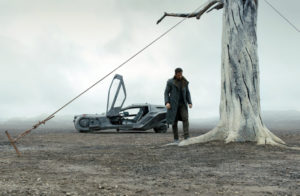image credit : “Memories” by harpsachord
Blade Runner 2049 – Review
by Derek A. Fisher
Memories are personhood. Or so the programming of a replicant would have you believe. A wooden horse. A fire. An industrial, steel-hued, future-washed MC Escher painting. Your mother. My Mother? Snapshots. They make sense, as implants. As things at once injected, probably plucked from algorithms set by Dr. Ana Stelline. What about us, the humans? Our memories have developed through organic processes over which we have little control. But sometimes, a flicker of a memory, or a deju vu, may feel like it holds a part of the puzzle, one of the keys to that locked room, the inexplicable, transcendent real. Proust’s madeleine. Child Ryan Gosling holding a wooden horse. A Unicorn running through the forest in a dream.
I seethed the moment they announced Blade Runner was getting a sequel. It was the most egregious sequel or remake that Hollywood could force down our throats, mostly because of the polarizing beauty and unique marvels of the original. Oh Denis Villeneuve is directing it? BIG DEAL. I’m supposed to give a shit you got a competent director? Wellllll, turns out they actually, finally made a sequel that was worthy of being made. 2049 is a beautiful, menacing, challenging film, one that I will watch into the future. Not only is it a thoroughly enjoyable viewing experience unto itself, but it adds new weight to the original.
 The plot appears to be simple; K (Ryan Gosling), a replicant Blade Runner whose job it is to retire rogue replicants (like Deckard in the original) discovers a haunting relic at the site of a mission; a box, buried near a tree, which contains the bones of a replicant woman, and her remains bear the sure signs that she had been pregnant. Fear that such a discovery could fuel another catastrophic replicant rebellion, K is tasked with finding the child born of the dead replicant and “retiring” it. Another layer – The deceased pregnant replicant was Rachel (Sean Young from the original Blade Runner, Deckard’s not-so-self-aware love interest). Worlds unfold. I’ll leave the rest to you.
The plot appears to be simple; K (Ryan Gosling), a replicant Blade Runner whose job it is to retire rogue replicants (like Deckard in the original) discovers a haunting relic at the site of a mission; a box, buried near a tree, which contains the bones of a replicant woman, and her remains bear the sure signs that she had been pregnant. Fear that such a discovery could fuel another catastrophic replicant rebellion, K is tasked with finding the child born of the dead replicant and “retiring” it. Another layer – The deceased pregnant replicant was Rachel (Sean Young from the original Blade Runner, Deckard’s not-so-self-aware love interest). Worlds unfold. I’ll leave the rest to you.
This film is much bigger than the trajectory of its plot, which makes it better than 97% of what Hollywood pumps out. The film has its flaws, certainly. Jared Leto’s blind industrialist Niander Wallace is criminally under-explored. Women feel pretty one-dimensional here compared to the men. But that sense of depth that the film leaves you with, whether it’s real or an implanted feeling injected into our memory systems, it makes you want to consider your own personhood. Could we all be replicants? Are my memories real? Is that one flash from my childhood holding the key to some traumatic mystery that I can’t access? Any work of art that makes you contemplate the philosophies behind your existence in this dank pit is a success.
To read more of Derek A. Fisher’s work, visit his site here.

